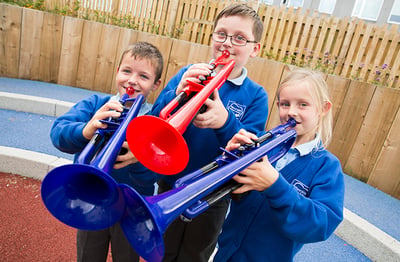Five Top Tips for Buying a Trumpet
September 25th, 2019
4 min read
.jpeg?width=4608&height=3456&name=Back%20Chat%20Brass%202%20(TinyJPG).jpeg)
 I’m a mum to three children aged 11, 9 and 6. Between them, they are involved in a number of different extra-curricular activities, all of which come with a lovely long list of ‘essential items’ that are required for them to take part. Add to these the cost of the lessons/club/activities, the ferrying to and fro of said activities and the time everything takes, something that appears to be simple and relatively low cost, to begin with, can end up becoming more complicated and rather more expensive.
I’m a mum to three children aged 11, 9 and 6. Between them, they are involved in a number of different extra-curricular activities, all of which come with a lovely long list of ‘essential items’ that are required for them to take part. Add to these the cost of the lessons/club/activities, the ferrying to and fro of said activities and the time everything takes, something that appears to be simple and relatively low cost, to begin with, can end up becoming more complicated and rather more expensive.
When one of my children wants to take up a new activity, whether that be rugby, dancing or trumpet lessons, my first port of call is a quick Google to see what it’s going to cost me in both time and money!
We’re going to assume here that you’ve already made the decision that you would like your child to learn the trumpet. Perhaps your decision has been led by your child - maybe they’ve been offered the opportunity by their school, or an after-school club, or seen something cool on YouTube. However you have reached this point, you are now faced with the tricky decision about which trumpet you should buy.
.jpg?width=400&name=DSC_0092%20(1).jpg)
Buying a musical instrument is like buying any piece of equipment that comes with your child’s extracurricular activities – a bit of a minefield if you don’t know anything about the item you are buying! With musical instruments, this can be tenfold – and quite often they have a heftier price tag too making them a higher-risk purchase. To that end, we have put together five top things to consider before buying a trumpet…
-
What type of trumpet should I buy?
Decide which type of trumpet you are looking for. Like buying a petrol/diesel/electric car, or matt, gloss or silk paint, trumpets also come in different options: Bb, C, D/Eb, piccolo… For beginners, the Bb is the most commonly recommended – they are used in virtually all types of music and because they are the most common you will find a larger selection of supporting materials and resources to choose from.
There is also the colour to consider; traditional brass trumpets are made from polished brass but can also be gold plated or finished in silver. There are now more colour choices available with the introduction of plastic brass instruments – red, blue, green, and black are all in the repertoire which is fun and engaging to a younger player, and can even be personalised with stickers to make them even more colourful.
-
Can my child hold it comfortably?
For a young child, comfort will be a big factor in how easily they can play and how long they can enjoy playing for. Depending on your child’s age/size a trumpet may still be a bit long for their arms – in which case you could consider a cornet instead (they are more compact, held a bit closer to the body and from a technical perspective play the same so your child can always graduate to a trumpet when they get a bit bigger). However, provided they can hold a trumpet consider the weight of the trumpet you are buying - if you have never picked up a trumpet you may be surprised at just how heavy they are!
-
What will it cost?
Ah yes – the 64 million dollar question; one person’s bargain is another’s limit. When buying a trumpet you will find a range of prices; the more specialised the trumpet, the higher the price. It doesn’t make much sense to buy the top of the range anything when starting out, but even at the beginner level of trumpets, there is a wide price range. Whatever your budget, consider not just the trumpet itself but also what you are getting for your money – does the trumpet come with a case, a mouthpiece, a warranty and how long will the trumpet last your child as they hopefully develop and improve?
-
How easy is it to maintain?
Another factor to consider when making your decision is how easy it will be for your child (and most likely you let's be honest) to look after their instrument. Cleaning a brass trumpet is relatively straightforward however it still involves taking the instrument apart, washing, drying, regreasing oiling etc and then you have to put everything back together in exactly the right way before it can be played again.
If you’re looking for something really low maintenance consider a plastic trumpet - you don’t have to oil the valves, and when taken out they are all the same size so can slot straight back in quickly and easily – a godsend if your child does dismantle it.
-
How reliable is it?
Beginner trumpets tend to be more robust than professional trumpets as a standard rule of thumb, the further up the scale you go (pardon the pun) the more delicate, and bespoke the instrument becomes. That being said, any brass instrument being made of brass is in danger of getting knocked or dented, and depending on where this happens on the instrument, this can either mean a dint, a disaster, or potentially a very large bill from an instrument repairer.
Plastic trumpets are not completely indestructible, but they can take much rougher and less careful treatment (link to video). They can also usually be repaired quickly and for minimal cost.
So there you have it – five top tips to help you make the best decision when buying a trumpet!
If you’re interested our recommendations would be:
Yamaha YTR2330 Student Trumpet (from £359)
Cream of the crop – the best student trumpet on the market with a price to match!
pTrumpet hyTech (from £199)
Matches the performance and appearance of the Yamaha but without the price tag (for more information on this do read the Normans blog Yamaha YTR2330 vs HyTech)
pTrumpet in 8 colours (from £107)
This a great starter instrument, very robust and easy to hold – also allows your son or daughter to pick their favourite colour.
If you do have any questions please do get in touch with us – we’ll be happy to help!
Read more...
How does music benefit your child? Read our blog why music matters.
What is the difference between a Yamaha YTR2330 vs hyTech?
Read one mum's experience of starting her child on their trumpet journey.
Experienced in marketing and PR, Sophie loves connecting with people through strategic communications and is responsible for Governance360’s marketing strategy, brand and content. An advocate of lifelong learning, in late 2020 Sophie completed the Marketing Week Mini MBA with Mark Ritson.
Graduating from Durham University with a BA in Theology, Sophie worked in events and communications, before moving into the events industry. With a sideways move into marketing for a busy agency, she has since gained over 14 years’ experience through a variety of industries and roles. Most recently she spent two years at Queen’s Award for Innovation winner Warwick Music as Marketing Manager before starting her marketing consultancy, Happy Marketer Ltd in 2021 alongside her work at Governance360.
